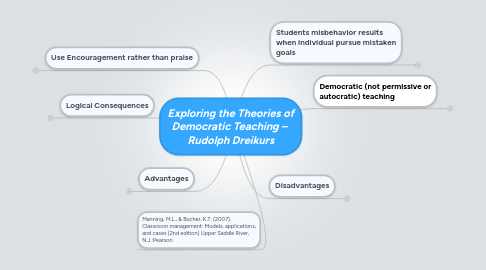
1. Logical Consequences
1.1. Must establish simple, specific classroom rules
1.1.1. Rules define
1.1.1.1. What behavior the teacher expects
1.1.1.2. What the students should do
1.1.1.3. How the class is conducted or how the day is structured
1.1.2. Rules may also contain
1.1.2.1. Consequences when rules are broken
1.1.2.2. Rewards when rules are followed
1.2. Implement logical consequences rather than punishments.
1.2.1. Behavioir (1) - A Student writes on a school desk
1.2.1.1. Logical Consequence (1) - The student must clean the desk.
1.2.2. Behavior (2) - A student destroys another’s property.
1.2.2.1. Logical Consequence (2) - The student (not the parent) must pay for the property.
1.2.3. Behavior (3) - A student refuses to complete assignments during class.
1.2.3.1. Logical Consequence (3) - The student does the work during recess or before/after school.
1.3. Use punishment only when all logical consequences have been exhausted
2. Use Encouragement rather than praise
2.1. Use more encouragement to boost confidence and self esteem
2.1.1. Encouragement (1): “I can tell you’ve been practicing your math drills and I hope you will continue.”
2.1.2. Encouragement (2): “I can tell you enjoy the challenges of learning to use a new computer program.”
2.2. Less praise - students can become dependent on the praise and begin to think they are of less worth if they do not / cannot continue the behavior
2.2.1. Praise (1): “You’re a fine student! You finished your math in record time.”
2.2.2. Praise (2): “You’re a whiz with that computer program.”
3. Advantages
3.1. (1) Promotes respect and communication among students and teachers
3.2. (2) Allows students to takes responsibility for their own actions, to help establish class rules, and to influence instructional practises
3.3. (3) Logical consequence - a fair and basic element in discipline plan
3.4. (4) Provided a caring classroom community, using student-centered instructional techniques, and promotes collaboration between teachers and students
4. Manning, M.L., & Bucher, K.T. (2007). Classroom management: Models, applications, and cases (2nd edition) Upper Saddle River, N.J.:Pearson
5. Democratic (not permissive or autocratic) teaching
5.1. Autocratic teaching - "I told you to do it now, you will do it now"
5.2. Permissive teaching - "Well, whatever you want to do is all right, I guess. I know you'll do the right thing wont you?
5.3. Democratic teaching - Teachers allows and encourage students to take an active, participatory role in developing classroom procedures, as well as in making curricular and instructional decision
6. Students misbehavior results when individual pursue mistaken goals
6.1. Attention getting
6.1.1. Dominant in young children who feel they have few opportunities to establish their social position through useful contributions or through socially acceptable means
6.1.1.1. Might prefer punishment to being ignored
6.2. Power seeking
6.2.1. To have a sense of self worth, power seeking students will want to control others and be the boss of a situation.
6.2.1.1. Might be disobedient, talk back, or overt resistance
6.3. Revenge
6.3.1. To feel significant and worthy(self-esteem), these students believe they must hurt someone in the same way they believe someone has to hurt them.
6.3.1.1. Might include stealing, kicking, and intentionally hurting others
6.4. Helplessness (feelings of inadequacy)
6.4.1. As long as they are left alone, nothing is demanded of them, and their deficiencies, inability, and inadequacies might not become obvious.
6.4.1.1. Might just want to be left alone, and work actively to avoid others
